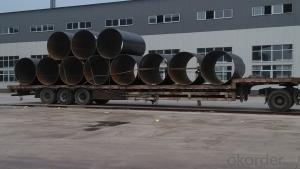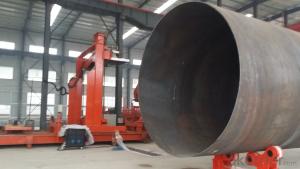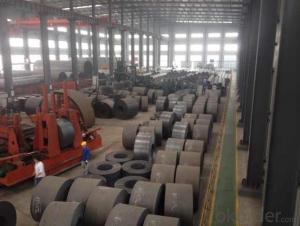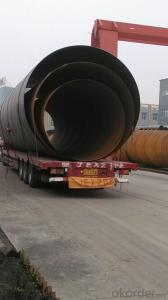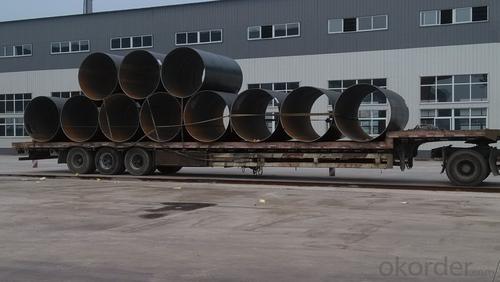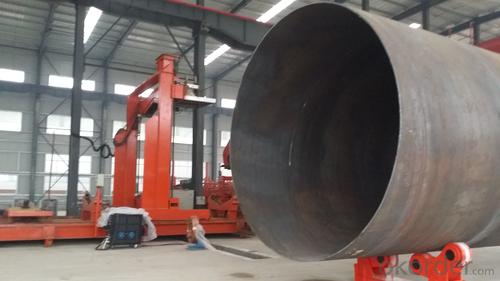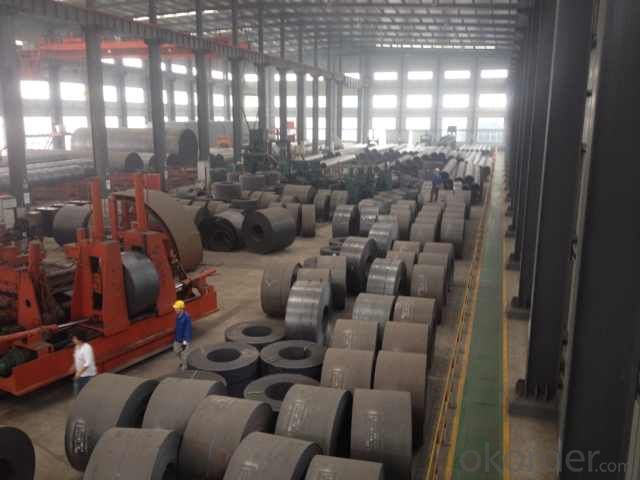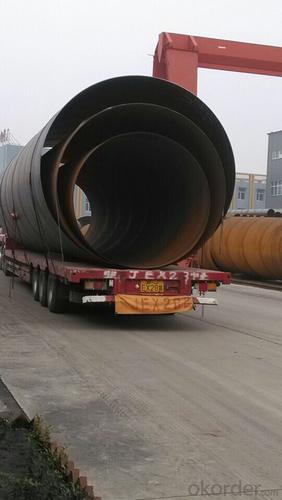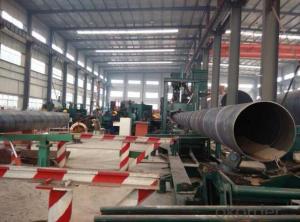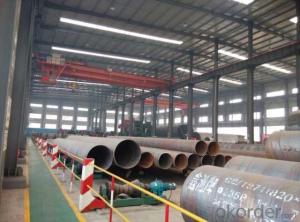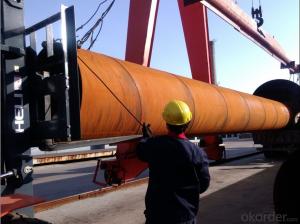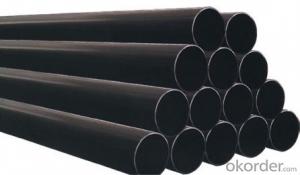SSAW STEEL PIPE 219-3920MM ASTM/API/DIN
- Loading Port:
- China Main Port
- Payment Terms:
- TT OR LC
- Min Order Qty:
- -
- Supply Capability:
- -
OKorder Service Pledge
OKorder Financial Service
You Might Also Like
Packaging & Delivery
Packaging Detail: | standard export packing or as customer's requirement |
Delivery Detail: | within 10 - 30 days |
Specifications
Spiral Welded Steel Pipes and Tubes
1.Material:Q195-Q235
2.Length:1-12m
3.WT:1.0-14mm
4.O.D.:219-3920mm
Product Description:
1.Material : Q235,Q345,L245,L290,L360,L415,L450,L485,GrB,X42,46,X52,X56,X60,X65,X70,X80,X100
2,Standard: SY/T5037-2000,GB/T9711-2011,API Spec 5L PSL1/PSL2,ASTM A252\A53,ISO3183,DIN17172,EN10217,JIS G3457,AWWA C200,ASTM A139,ASTM A671,ASTM A672
3.Wall thickness: 3.0mm-30mm
4.Outer diameter: φ219mm-3920mm
5,Length: 5m-12m or as customer requirement
6,Corrosion protection standard: DIN30670,DIN30671, AWWAC210, AWWA C203, SY/T0413-2002,SY/T0414-2002
7,Application: Oil, gas, natural gas, water pipe, thermal electricity pipe, steel structure engineering, etc
Q195-Q345 Material Steel Pipe's Materials
Elements | Chemical Compsition% | Mechanical Property | ||||||
| C% | Mn% | S% | P% | Si% | Yield Point (Mpa) | Tensile Strength(Mpa) | Elongation |
Q195 | 0.06-0.12 | 0.25-0.50 | <0.050 | <0.045 | <0.030 | >195 | 315-430 | 32-33 |
Q215 | 0.09-0.15 | 0.25-0.55 | <0.05 | <0.045 | <0.030 | >215 | 335-450 | 26-31 |
Q235 | 0.12-0.20 | 0.30-0.70 | <0.045 | <0.045 | <0.030 | >235 | 375-500 | 24-26 |
Q345 | <0.20 | 1.0-1.6 | <0.040 | <0.040 | <0.55 | >345 | 470-630 | 21-22 |
- Q: How are steel pipes used in the manufacturing of chemical storage tanks?
- Steel pipes are commonly used in the manufacturing of chemical storage tanks as they provide structural support and serve as conduits for the transportation of chemicals. These pipes are typically used for connecting various components of the tank, such as the inlet and outlet valves, as well as for creating the internal plumbing system. The durability and corrosion resistance of steel make it an ideal material for ensuring the integrity and longevity of chemical storage tanks.
- Q: Can steel pipes be used for mining applications?
- Yes, steel pipes can be used for mining applications. Steel pipes are known for their strength, durability, and resistance to extreme conditions, making them suitable for various mining activities such as transporting water, air, or chemicals, as well as for structural support and ventilation systems in mines.
- Q: How many meters per ton of steel tube?
- Metric tons are metric units and China adopts metric system, so what we Chinese usually say "ton" means "metric ton", which can be regarded as "metric ton"1 metric tons (tonne/metric ton) = 1000 kg1 tons = 1000 kg1 kg = 1000 grams
- Q: How are steel pipes protected against ultraviolet (UV) radiation?
- Steel pipes can be protected against ultraviolet (UV) radiation through the application of coatings or paints that act as a barrier between the pipe surface and the UV rays. These coatings are specifically designed to resist the damaging effects of UV radiation, such as fading, chalking, or degradation of the steel material. One common method of protection is the use of UV-resistant paints or polymeric coatings that contain special additives or pigments that reflect or absorb UV rays. These coatings not only shield the steel from UV radiation but also provide an additional layer of corrosion protection, extending the lifespan of the pipes. Another method used for UV protection is the application of thermal insulation materials. These insulating materials, such as foam or coatings with reflective properties, are capable of reducing the impact of UV radiation on the steel pipes. They act as a shield, preventing direct exposure to the UV rays and minimizing the potential damage caused by prolonged exposure. It is important to note that the choice of UV protection method depends on various factors, including the specific application, environmental conditions, and the required durability of the steel pipes. Consulting with experts in the field can help determine the most suitable UV protection solution for a particular project or application.
- Q: What are the safety measures to consider when working with steel pipes?
- When working with steel pipes, it is important to consider several safety measures. Firstly, wearing appropriate personal protective equipment (PPE) such as gloves, safety glasses, and steel-toed boots is crucial to protect against potential injuries. Secondly, ensuring proper ventilation in the work area is important to avoid inhalation of harmful gases or fumes. Additionally, practicing proper lifting techniques and using mechanical aids when handling heavy pipes can prevent strains or back injuries. It is also essential to be cautious of sharp edges or protruding objects on the pipes and to secure them properly to prevent accidents. Lastly, following established safety protocols, such as conducting regular inspections and adhering to lockout/tagout procedures, helps minimize the risk of accidents or equipment malfunctions.
- Q: What are the different types of joints used in steel pipes?
- There are several types of joints commonly used in steel pipes, including threaded joints, welded joints, flanged joints, and grooved joints.
- Q: Where is the difference between seamless steel pipe and welded pipe?
- The steel tube is a hollow steel strip, used as pipe conveying fluid, such as oil, gas, water, gas, steam, in addition, the bending and torsional strength of the same, the weight is light, so it is widely used in the manufacture of machinery parts and engineering structures. It is also used to produce all kinds of conventional weapons, guns, shells and so on.
- Q: What is the difference between steel pipes and ductile iron pipes?
- Steel pipes and ductile iron pipes are both commonly used for various applications in the construction industry, but they differ in their composition and properties. Steel pipes are primarily made from an alloy of iron and carbon, with small amounts of other elements. They are known for their high tensile strength and durability, making them suitable for transporting fluids and gases under high pressure. Steel pipes are more resistant to corrosion than ductile iron pipes, and they can withstand extreme temperatures and environmental conditions. On the other hand, ductile iron pipes are made from an alloy of iron, carbon, and small amounts of other elements like silicon and magnesium. These pipes are characterized by their high strength, impact resistance, and flexibility. Ductile iron pipes are often used for water and sewage transportation due to their corrosion resistance and ability to withstand ground movement and heavy loads. In summary, steel pipes are known for their strength, durability, and corrosion resistance, while ductile iron pipes offer greater flexibility and impact resistance. The choice between the two depends on the specific application requirements and environmental conditions.
- Q: Can steel pipes be used for air conditioning systems?
- Yes, steel pipes can be used for air conditioning systems. Steel pipes are commonly used in HVAC (Heating, Ventilation, and Air Conditioning) systems as they are durable, can withstand high pressures, and are resistant to corrosion.
- Q: How are steel pipes used in the manufacturing of pulp and paper mills?
- Steel pipes are used in the manufacturing of pulp and paper mills for various purposes, such as conveying water, steam, and chemicals, as well as transporting pulp and paper materials within the facility. These durable pipes are essential for the efficient and reliable operation of the mills, ensuring a continuous flow of resources and facilitating the production processes.
Send your message to us
SSAW STEEL PIPE 219-3920MM ASTM/API/DIN
- Loading Port:
- China Main Port
- Payment Terms:
- TT OR LC
- Min Order Qty:
- -
- Supply Capability:
- -
OKorder Service Pledge
OKorder Financial Service
Similar products
Hot products
Hot Searches
Related keywords
